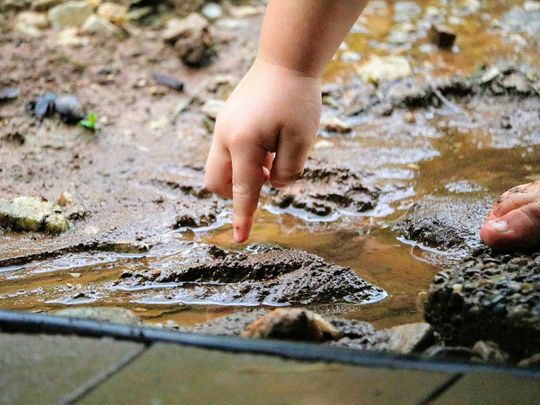
When we were younger, we would often hear a familiar refrain from our parents as we’d dash outside to play: “Don’t get dirty!” or “Don’t spoil your clothes!” Nowadays, however, most parents likely wish their children would get a little grimy – if only so that it means they’ve ditched their video games to play outdoors.
Click start to play today’s Word Search, where we explore the benefits that come with the ‘freedom’ of getting mucky outdoors.
Children love dirt. They zone in on muddy puddles like magnets, and don’t care about shoes, clothes, or other aspects that parents concern themselves with. While the benefits of outdoor play are well established, research now shows that playing in dirt specifically, can have a surprisingly powerful impact on children’s health and wellbeing.
According to an October 2022 report in UK-based news website BBC Future, the dirt, soil or mud you find outside is teeming with friendly microorganisms, which can help immune systems build resilience to a range of illnesses, from allergies and asthma to depression and anxiety. A June 2022 study in the journal Paediatric Allergy and Immunology found that people who grow up on farms are less likely to develop asthma, allergies or auto-immune disorders, because of exposure to a diverse range of organisms in their childhood years.
Besides its physiological impact, exposure to Nature helps children in many other ways. A March 2009 study in the US-based Journal of Attention Disorders found that children with attention-deficit hyperactivity disorder (ADHD) were better able to focus after a 20-minute walk in the park, compared to a 20-minute walk in an urban street. Apart from the proximity to grass and trees, which had a calming effect on their minds, parks offered them an opportunity for creative outdoor play and valuable learning experiences. Kneading mud or sand, for instance, has been found to help in children’s sensorimotor development – the way their senses and movement interact.
For a long time, however, children haven’t had the opportunity to get dirty. In the late 1980s, according to BBC Future, a focus on hygiene (dubbed the 'hygiene hypothesis') led to a great reduction in childhood infections over the next few decades. But it also had an unforeseen effect. It led people’s immune systems to overreact at the slightest stimulation, leading to a rise in asthma, food allergies and hay fever.
Now, scientists agree that non-infectious organisms, which are mostly harmless, are beneficial, especially for children, since they train their immune systems and better prepare their bodies to fight off potential invaders.
But with increased urbanisation around the world, more time spent indoors, and gadgets and screens all around them, how could parents encourage children to play outdoors?
Some countries around the world are taking steps by making it a focus of early education. In Finland, an ambitious project aims to bring Nature to children, according to an October 2020 study in the journal Science Advances. In four daycare centres, researchers replaced asphalt and gravel with soil and vegetation taken from boreal forest floor. Children were also given planting boxes for gardening. In just one month, researchers found that the children had heightened microbial diversity on their skin and in their gut, as well as better immune function. The proportion of anti-inflammatory molecules in their blood plasma also increased.
In other countries, like Italy, many daycare centres and schools are offering ‘mud kitchens’ – with just an old table, and some pots and pans filled with a mixture of water and soil. More advanced kitchens have cupboards and drawers filled with stones, rocks, sticks, vegetation and sand: The perfect environment for mud chefs to make imaginative creations, cultivate their minds and improve their immunity.
What do you think about letting kids get dirty outdoors? Play today’s Word Search and tell us at games@gulfnews.com.






